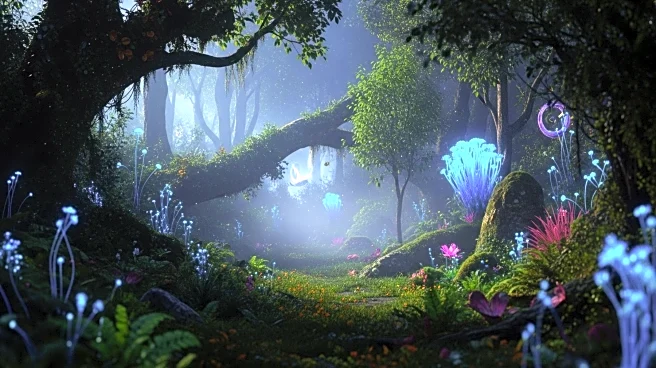What's Happening?
Publishers Weekly has reviewed 'ECO24: The Year’s Best Speculative Ecofiction,' edited by Marissa van Uden. This anthology brings together 23 stories that explore humanity's fears, grief, and passion in the context of environmental protection. The collection features works from established authors like Eugen Bacon and Hiron Ennes, as well as newcomers such as F.E. Choe and Trae Hawkins. Notable stories include Jennifer Hudak’s 'The Colonists,' which deals with a human colony's interaction with sentient fungi, and Louis Evans’s 'A Seder in Siberia,' which parallels a family's struggles with the Exodus story. The anthology is praised for its thought-provoking and impactful narratives.
Why It's Important?
The anthology 'ECO24' underscores the growing trend of using speculative fiction to address environmental issues. By weaving narratives that highlight the consequences of human actions on nature, these stories can raise awareness and inspire change. The inclusion of diverse voices and perspectives enriches the dialogue around environmental protection, potentially influencing public opinion and policy. As climate change remains a pressing global issue, literature like this can play a crucial role in shaping societal attitudes and encouraging sustainable practices.
What's Next?
The release of 'ECO24' may inspire further literary works that tackle environmental themes, encouraging publishers to invest in similar projects. Readers and literary critics might engage in discussions about the role of fiction in environmental advocacy, potentially leading to increased visibility for ecofiction as a genre. Additionally, educational institutions could incorporate such works into curricula to foster environmental consciousness among students.
Beyond the Headlines
The anthology's exploration of environmental themes through speculative fiction highlights the ethical responsibility of storytellers to address real-world issues. It also reflects a cultural shift towards valuing narratives that challenge readers to think critically about their relationship with the environment. This trend may influence other creative industries, such as film and television, to produce content that emphasizes sustainability and ecological awareness.









